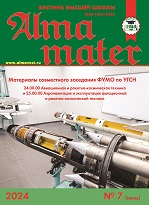Olga V. Andryushkova, Cand. Sci. (Chemistry), Docent, Associate Professor, Head of the Laboratory of Methods of Teaching Chemistry, Department of General Chemistry, Faculty of Chemistry, Lomonosov Moscow State University, Russia; https://orcid.org/0000-0002-1566-3427; e-mail: o.andryushkova@gmail.com
Artem A. Zaripov, 5th year student, field of study 04.05.01 “Fundamental and applied chemistry”, specialization “Theory and methodology of teaching chemistry”, Faculty of Chemistry, Lomonosov Moscow State University, Russia, https://orcid.org/ 0009-0008-6794-5048; e-mail: a_zaripov9622@mail.ru
The activities of teachers and lecturer at the university in organizing and conducting the educational process for natural science areas of study include the man
The work was supported by research work Information and methodological support for the development of fundamental chemical education and research in chemistry. №121121600197-3. For more details: https://istina.msu.ru/projects/349472995
References
1. Zaitsev, O.S. Practical guidelines for teaching chemistry in middle and high school: textbook. Moscow: KARTEK, 2012. 470 p. (In Rus.)
2. Chernobelskaya, G.M. Technique of teaching chemistry in middle school. Moscow: VLADOS, 2000. 336 p. (In Rus.)
3. Ishkov, A.D. Educational activity of a student: рsychological factors for success. Moscow: ASV, 2004. 224 p. (In Rus.)
4. Andryushkova, O.V., Budanova, A.A. Building a hierarchy of tasks in chemistry based on typologization. Science Education: methodological foundations of the development of tasks in chemistry. 2022. (18): 193–206. (In Rus.) EDN: OTXMOI
5. Maltseva, N.N., Penkov, V.E. Point-based grading system: advantages and disadvantages. Higher Education in Russia. 2021. 30 (4): 139–145. (In Rus.) DOI: 10.31992/0869-3617-2021-30-4-139-145
- Kolyagin, Yu.M. Tasks in teaching mathematics. Moscow: Prosveshchenie, 1977. 110 p. (In Rus.)
7. Fridman, L.M. Plot tasks in mathematics: history, theory, methodology. Moscow: Shkol’naia pressa, 2002. 208 p. (In Rus.)
8. Eremin, V.V., Kuzmenko, N. E., Drozdov, A.A., Lunin, V.V. Chemistry. 7–11 grade. Moscow: Drofa, 2019–2020. (In Rus.)
9. Avanesov, V.S. Composing test problems. Moscow: Adept, 1998. 217 p. (In Rus.)
10. Vostretsova, E.V., Korshunova, E.V., Martynova, E.V. Composing pedagogic tests for digital educational resources. Ekaterinburg: Ural Federal University Press, 2022. 25 p. (In Rus.)
11. Chernyavskaya A. P., Grechin B. S. Contemporary means of assessing education results. Yaroslavl, YSPU; 2008. 98 p. (In Russian.)]
12. Gronlund, N.E. Constructing Achievement Tests. London: Prentice Hall, 1982. 148 p.
13. Klishina, S.V. Guluykina, N.A. Pedagogical test: stages and features of design and use. Novosibirsk: NSTU Press, 2006. 148 p. (In Rus.)
14. Chelyshkova, M.B. Theory and practice of composing pedagogical tests. Moscow: Logos, 2002. 432 p. (In Rus.)
15. Selivanova, I.A., Markovina, I.Yu., Ilyasov, I.R., Zhevlakova, A.K., Terekhov, R.P. Test items validation in the context of education export. Higher Education in Russia. 2020. 29 (6): 136–143. (In Rus.). DOI: 10.31992/0869-3617-2020-6-136-143
16. Norcini, J., McKinley, D.W. Concepts in assessment including standard setting. A Practical Guide for Medical Teachers. Beijing: Elsevier Health Sciences, 2017. Р. 252–259
17. Maiorov, A.I. Theory and practice of composing tests for the education system: how to select, make and use tests for education purposes. Moscow: Intellekt-tsentr, 2001. 296 p. (In Rus.)
18. Leonenkov, A.V. Fuzzy simulation in MATLAB and fuzzyTECH. St. Petersburg, BKHV-Peterburg, 2005. 736 p. (In Rus.)
- Zadeh, L.A. Fuzzy sets. Information and Control. 1965. 8 (3): 338–353. DOI: 10.1016/S0019-9958(65)90241-X
- Andryushkova, O.V., Grigoriev, S.G. Methodology for assessment of the quality of learning based on negentropy. Informatics and Education. 2019. 34 (10): 37–45. (In Rus.) DOI: 10.32517/0234-0453-2019-34-10-37-45











.png)






